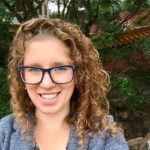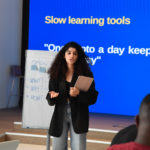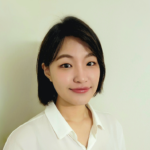Selin Akgün is a Ph.D. candidate in the program of Teacher Education at Michigan State University. She is currently working as a research assistant in the Multiple Literacies in Project-Based Learning (ML-PBL) project at CREATE for STEM Institute. Selin’s research focuses on teacher identity and promoting elementary students’ science sensemaking and social-emotional learning. Her research also focuses on the applications of artificial intelligence (AI) in educational settings and centers how to teach societal and ethical implications of AI in K-12 STEM settings. Twitter: https://twitter.com/selinakgun9
ResearchGate: https://www.researchgate.net/profile/Selin-Akgun
Aisel (“Ice”) Akhmedova is second-year PhD student in the Educational Psychology and Educational Technology program within the College of Education at Michigan State University. Her research delves into the impact of digital technologies on learning, particularly focusing on the connection between social media, teachers, and students.
Ha-Neul Kim is a Ph.D. student in the School of Social Work at Michigan State University. Ha–Neul Kim earned her M.S.W. from Yonsei University in Republic of Korea in 2020. She is passionate about creating change in society and promoting a better world for older adults. Her research interests are in the fields of aging & technology, digital inclusion, telehealth, dementia, and social policies supporting the dignity of older adults. She also focuses on the use of topic modeling and text mining methodology into social work research.
Jenn Sutcliffe is a second-year PhD student in the Educational Psychology and Educational Technology program at Michigan State University. She is interested in researching identity, enjoyment, motivation, and digital literacies within the contexts of social media, gaming, informal learning, and online learning communities. She has worked in education for 15 years including as an instructional designer, public and academic librarian, and consultant. She holds an M.Ed. from the University of Georgia, MLS from the University of North Texas, and B.S./B.A. (anthropology and journalism) from Emory University. Her practicum project will explore the effect of identity shift and projective identity on motivation and decision-making in first-person narrative games.
Dr. Emilia Askari is a graduate of the Educational Psychology and Educational Psychology PhD program at Michigan State University. She is interested in technology, learning and civic engagement. Emilia also is a journalist, a lecturer at the University of Michigan, and the mother of two teens. She’s won more than 20 prizes and fellowships and served on the national boards of several professional organizations, including the Accrediting Council for Education in Journalism and Mass Communication. Emilia earned a bachelor’s in economics and creative writing from Brown University, a master’s in journalism from Columbia University, and a master’s in information studies from the University of Michigan.
 Dr. Diana Brandon, Ph.D. in Educational Psychology and Educational Technology, holds an MA in Curriculum and Instruction and a BA in English. She is the current Chief Innovation Officer for eLearningDOC. She was a Teaching Faculty member at Florida State University and an instructional designer in higher education. With experience in K-12 classrooms, higher education, and museum education, her research focuses on technology integration and professional development for educators. Dr. Brandon’s work explores the impact of emerging technologies and social media on learning and performance. She has authored over 25 peer-reviewed papers and presentations. Her research focuses on technology integration and professional development for educators with experience in K-12 classrooms, higher education, and museum education.
Dr. Diana Brandon, Ph.D. in Educational Psychology and Educational Technology, holds an MA in Curriculum and Instruction and a BA in English. She is the current Chief Innovation Officer for eLearningDOC. She was a Teaching Faculty member at Florida State University and an instructional designer in higher education. With experience in K-12 classrooms, higher education, and museum education, her research focuses on technology integration and professional development for educators. Dr. Brandon’s work explores the impact of emerging technologies and social media on learning and performance. She has authored over 25 peer-reviewed papers and presentations. Her research focuses on technology integration and professional development for educators with experience in K-12 classrooms, higher education, and museum education.
 Dr. Amy Chapman, is currently the Director of Operations for the New Jersey Psychological Association. In this role, as in prior administrative roles in nonprofit organizations, she manages NJPA’s events, continuing education offerings, and charitable foundation. Amy is also a researcher, using qualitative approaches to understand how people define, develop, and change communities. She has published widely on both how social media can be used within educational contexts and how spirituality impacts school culture and wellness. A former public and private school teacher, Amy holds three degrees from Boston College and a doctorate in Educational Psychology and Educational Technology from Michigan State University. Amy’s first book, Social Media for Civic Education: Engaging Youth for Democracy was published in October 2022. She is an editor of Supporting Children and Youth Through Spiritual Education, published in 2023 by IGI Global.
Dr. Amy Chapman, is currently the Director of Operations for the New Jersey Psychological Association. In this role, as in prior administrative roles in nonprofit organizations, she manages NJPA’s events, continuing education offerings, and charitable foundation. Amy is also a researcher, using qualitative approaches to understand how people define, develop, and change communities. She has published widely on both how social media can be used within educational contexts and how spirituality impacts school culture and wellness. A former public and private school teacher, Amy holds three degrees from Boston College and a doctorate in Educational Psychology and Educational Technology from Michigan State University. Amy’s first book, Social Media for Civic Education: Engaging Youth for Democracy was published in October 2022. She is an editor of Supporting Children and Youth Through Spiritual Education, published in 2023 by IGI Global.
 Monaca Eaton. Within the context of higher education, Monaca’s research interest has focused on the new media literacy skills social work educators and students need to provide ethical, competent and engaged social work practice in the digital age. She is interested in understanding the role social media plays in formal and informal adult learning, as well as ways in which social media can be used to inspire, empower and connect, all for the promotion of human and community well-being. She currently is the Associate Director for Teaching and Instruction and a senior clinical instructor at the School of Social Work at Michigan State University and a doctoral student in the Educational Psychology and Educational Technology program in the College of Education. Monaca was an Adam’s Academy Fellow for Innovation in Teaching and Learning and teaches courses at both the undergraduate and graduate level infused with technology and social media.
Monaca Eaton. Within the context of higher education, Monaca’s research interest has focused on the new media literacy skills social work educators and students need to provide ethical, competent and engaged social work practice in the digital age. She is interested in understanding the role social media plays in formal and informal adult learning, as well as ways in which social media can be used to inspire, empower and connect, all for the promotion of human and community well-being. She currently is the Associate Director for Teaching and Instruction and a senior clinical instructor at the School of Social Work at Michigan State University and a doctoral student in the Educational Psychology and Educational Technology program in the College of Education. Monaca was an Adam’s Academy Fellow for Innovation in Teaching and Learning and teaches courses at both the undergraduate and graduate level infused with technology and social media.
 Dr. Sarah Galvin is a graduate of the PhD program in the Educational Psychology and Educational Technology program at Michigan State University. Her research interests surround the intersection of social media and writer identity in adolescent learning. More specifically, her dissertation examined how student authorship differs on social media compared to in the classroom and what implications this might have for writing pedagogy. Formally a public high school English teacher, Sarah has explored adolescents’ writer identities across their social media platforms. Currently, she works as a Learning and Development specialist, leading the Learning and Development department at C3 Industries in Ann Arbor. Her role includes instructional design, curriculum design, teaching, ed tech tool management and implementation, and company-wide research projects related to training and professional development.
Dr. Sarah Galvin is a graduate of the PhD program in the Educational Psychology and Educational Technology program at Michigan State University. Her research interests surround the intersection of social media and writer identity in adolescent learning. More specifically, her dissertation examined how student authorship differs on social media compared to in the classroom and what implications this might have for writing pedagogy. Formally a public high school English teacher, Sarah has explored adolescents’ writer identities across their social media platforms. Currently, she works as a Learning and Development specialist, leading the Learning and Development department at C3 Industries in Ann Arbor. Her role includes instructional design, curriculum design, teaching, ed tech tool management and implementation, and company-wide research projects related to training and professional development.
 Dr. Youngjun Lee is a graduate of the PhD program in Measurement and Quantitative Methods at Michigan State University. He collaborated on the development and implementation of an online survey instrument for low-income students’ social media use. Youngjun is interested in (multilevel) item response theory, structural equation modeling, methodological issues in large-scale assessment, and growth (mixture) modeling within a framework of latent variable modeling. He has participated a variety of projects concerning methodological psychometric issues in a field of education, such as constructing and scaling IRT-based SES index using National Assessment of Educational Progress (NAEP). He earned M.A. (in educational measurement, evaluation, and quantitative methods program) and B.A. (in education) degrees at Yonsei University, South Korea.
Dr. Youngjun Lee is a graduate of the PhD program in Measurement and Quantitative Methods at Michigan State University. He collaborated on the development and implementation of an online survey instrument for low-income students’ social media use. Youngjun is interested in (multilevel) item response theory, structural equation modeling, methodological issues in large-scale assessment, and growth (mixture) modeling within a framework of latent variable modeling. He has participated a variety of projects concerning methodological psychometric issues in a field of education, such as constructing and scaling IRT-based SES index using National Assessment of Educational Progress (NAEP). He earned M.A. (in educational measurement, evaluation, and quantitative methods program) and B.A. (in education) degrees at Yonsei University, South Korea.
 Dr. Holly Marich. Holly’s research interests include traditional and New Literacies development among children, specifically K-5 elementary students. She is a graduate of the Educational Psychology and Educational Technology PhD program at Michigan State University. Her dissertation investigated second-grade student development of traditional and New Literacy skills as they tweet in their class Twitter account about the “what” and “why” of their daily classroom learning. She is also interested in how to support teachers and their development of Technological-Pedagogical-Content knowledge, TPACK, exploring the affordances of supporting teacher TPACK development through the facilitation of teacher action research communities as professional learning. In addition to her work at MSU, Holly serves on the executive committee as director of membership for the Action Research Network of the Americans and is employed full time for the State of Nevada as a professional development provider working with teachers across the Northeastern region of the state around topics of literacy and technology.
Dr. Holly Marich. Holly’s research interests include traditional and New Literacies development among children, specifically K-5 elementary students. She is a graduate of the Educational Psychology and Educational Technology PhD program at Michigan State University. Her dissertation investigated second-grade student development of traditional and New Literacy skills as they tweet in their class Twitter account about the “what” and “why” of their daily classroom learning. She is also interested in how to support teachers and their development of Technological-Pedagogical-Content knowledge, TPACK, exploring the affordances of supporting teacher TPACK development through the facilitation of teacher action research communities as professional learning. In addition to her work at MSU, Holly serves on the executive committee as director of membership for the Action Research Network of the Americans and is employed full time for the State of Nevada as a professional development provider working with teachers across the Northeastern region of the state around topics of literacy and technology.
 Dr. Bret Staudt Willet is a graduate of the PhD program in the Educational Psychology and Educational Technology program at Michigan State University and is currently an Assistant Professor at Florida State University. He is interested in how and why teachers connect with each other through social media platforms such as Twitter. Bret’s research is interdisciplinary and utilizes a variety of methods—both human and computational—including qualitative content analysis, social network analysis, and machine learning. He has taught each of the courses in MSU’s Graduate Certificate in Online Teaching and Learning. Bret holds a master’s degree in Educational Technology and a graduate certificate in Serious Games Research and Design from Michigan State University, and a bachelor’s degree in mathematics and sociology from Bucknell University.
Dr. Bret Staudt Willet is a graduate of the PhD program in the Educational Psychology and Educational Technology program at Michigan State University and is currently an Assistant Professor at Florida State University. He is interested in how and why teachers connect with each other through social media platforms such as Twitter. Bret’s research is interdisciplinary and utilizes a variety of methods—both human and computational—including qualitative content analysis, social network analysis, and machine learning. He has taught each of the courses in MSU’s Graduate Certificate in Online Teaching and Learning. Bret holds a master’s degree in Educational Technology and a graduate certificate in Serious Games Research and Design from Michigan State University, and a bachelor’s degree in mathematics and sociology from Bucknell University.

Dr. Benjamin Gleason is an Associate Professor of Curriculum and Instructional Technology at Iowa State University. His research interests include the use of social media for teaching, learning, and leadership, focusing on how students (K-12, college, and graduate students) practice literacy, develop identity, engage in digital citizenship, and create new forms of humanizing pedagogy. He has published in the British Journal of Educational Technology, Learning, Media, Technology, Journal of Educational Technology and Society, Journal of Adolescent and Adult Literacy, among others. With colleagues, he co-founded the Social Media SIG of the Society for Instructional Technology and Teacher Education (SITE). He holds a B.A. in American Literature from Oberlin College and a Ph.D in Educational Psychology & Educational Technology from Michigan State University.
Dr. Jiahang Li is an Associate Professor in the Department of Teacher Education, outreach coordinator of the Asian Studies Center and director of the Online Chinese Program at College of Education at Michigan State University. Dr. Li earned a Ph.D. degree in Reading Education from University of Maryland College Park, his research interests include the impacts that social media has on teaching and learning, educational technology, teacher education, teaching Chinese as a foreign language, and multicultural literature. He earned M.A. and B.A degrees in Chinese Classical Philology from Department of Chinese Language and Literature at Peking University, China. He prefers a communicative approach in language teaching with a focus on providing meaningful and comprehensive input in real life context. He believes the proliferation of technology can benefit students in multiple dimensions, especially in an online or distance environment.
 Dr. Jessica Wicks is a 2015 graduate of the inaugural hybrid Ph.D. program in Educational Psychology and Educational Technology at Michigan State University. Her dissertation, entitled Adjunct Socialization with Social Media: The Moodle Socialwall, examined the potential of a natively-hosted social media solution to support organizational socialization for community college adjunct faculty. Jessica also holds both M.A. and B.S. degrees in Human Development and Family Studies from Central Michigan University. Her current research interests include innovations in online learning and the design of development opportunities for dispersed and commuter student and faculty audiences. She is employed full-time as a consultant at Central Michigan University’s Center for Excellence in Teaching and Learning, where she partners with faculty to create engaging learning experiences in many formats. Her diverse practice as an educator, instructional designer, administrator, and educational technologist has spanned contexts including community colleges, universities, online education, and medical school settings.
Dr. Jessica Wicks is a 2015 graduate of the inaugural hybrid Ph.D. program in Educational Psychology and Educational Technology at Michigan State University. Her dissertation, entitled Adjunct Socialization with Social Media: The Moodle Socialwall, examined the potential of a natively-hosted social media solution to support organizational socialization for community college adjunct faculty. Jessica also holds both M.A. and B.S. degrees in Human Development and Family Studies from Central Michigan University. Her current research interests include innovations in online learning and the design of development opportunities for dispersed and commuter student and faculty audiences. She is employed full-time as a consultant at Central Michigan University’s Center for Excellence in Teaching and Learning, where she partners with faculty to create engaging learning experiences in many formats. Her diverse practice as an educator, instructional designer, administrator, and educational technologist has spanned contexts including community colleges, universities, online education, and medical school settings.





